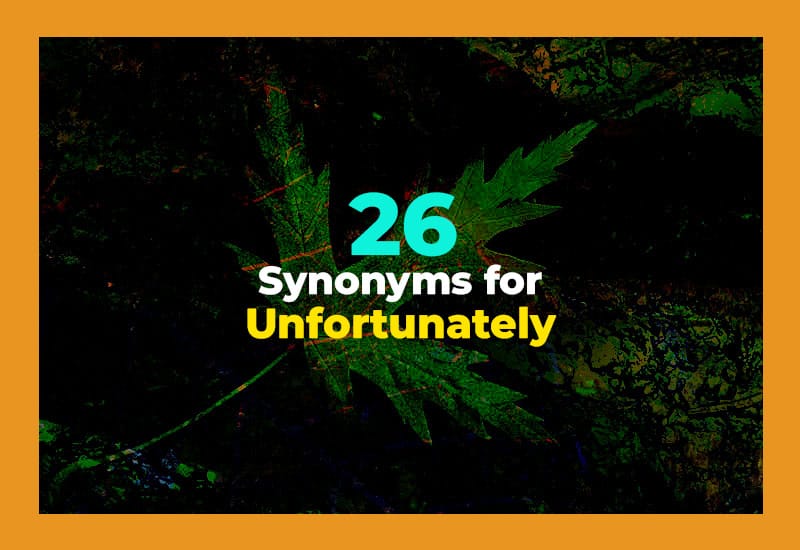You know how sometimes things don't go as planned? Well, saying "unfortunately" all the time can get a bit boring. Luckily, there are many other words like "regrettably" and "sadly" that help you express those little disappointments in fun ways. Let's explore some cool alternatives you can use every day!
1. Unluckily
Unluckily means something bad happened by chance. It shows that things didn't go well. For example, "Unluckily, it rained during our picnic." We don't blame anyone; it's just bad luck. You can use it when something disappointing happens without anyone's fault. It's a simple way to say that the situation wasn't fair or right. People say it when they want to share bad news softly. So, next time things don't work out, try saying "unluckily" to show your feelings in an easy way.
2. Regrettably
Regrettably means you feel sorry about something that happened. It's a polite way to say bad news. For example, "Regrettably, the event has been canceled." It sounds serious but kind. You can use it in emails, letters, or conversations when you want to show respect. It helps to express sadness about things that can't be changed. If you miss an important meeting, you can say "Regrettably, I was unable to attend." It's a good word to show you care about what went wrong.
3. Sadly
Sadly means you feel unhappy or sorry about something. It's a simple word to show emotion. For example, "Sadly, my favorite store is closing." People use it when something disappointing or upsetting happens. It's easy to understand and sounds friendly. You can say it when telling bad news to friends or family. If a pet is sick, you might say, "Sadly, he needs a visit to the vet." It helps you share feelings in a clear and gentle way.
4. Unhappily
Unhappily means something didn't happen in a good way. It's like feeling upset or sad. For example, "Unhappily, we lost the game." It shows that the result was not what you wanted. You can use it when talking about bad or sad news. It sounds a bit formal but still easy to use. If plans change and you feel bad about it, you can say, "Unhappily, we must cancel our trip." It's a nice way to share sad moments without being too strong.
5. Alas
Alas is an old-fashioned but cool word for "unfortunately." It sounds a little dramatic. For example, "Alas, the show was canceled." People use it in stories or poems to add feeling. It's short and easy to say. You can use it when you want to sound a bit fancy or funny. If you lose your keys, you could say, "Alas, I can't find them anywhere." It's a fun word to show sadness or disappointment with a little style.
6. Deplorably
Deplorably means something is very bad or sad. It's a stronger way to say "unfortunately." For example, "Deplorably, the house was damaged by the storm." It shows a serious problem or mistake. People use it in news or reports to explain bad situations. You might say, "Deplorably, many animals lost their homes." It's not used much in everyday talk but is good when you want to sound serious or important about bad things.
7. Disappointingly
Disappointingly means something didn't meet your hopes or wishes. For example, "Disappointingly, the movie was boring." It shows you expected something better. You can use it when you want to share that you feel let down. If your team loses, you could say, "Disappointingly, we didn't win." It's easy to understand and used when sharing feelings about things that don't go well. This word helps express sadness without being too strong or formal.
8. Woefully
Woefully means very sadly or badly. It shows strong disappointment. For example, "Woefully, the plan failed." It's a little dramatic and used in serious stories or talks. You can say it to show things went very wrong. If a team plays badly, someone might say, "Woefully, they made many mistakes." It's not common in casual talk but helps express deep sadness or trouble clearly.
9. Lamentably
Lamentably means something is sad or bad, and you feel sorry about it. For example, "Lamentably, the project was stopped." It's a formal word, often used in writing or speeches. You use it to explain that something ended badly or didn't work out. If a friend moves far away, you might say, "Lamentably, we won't see each other much." It sounds serious and polite, perfect for important talks about sad news.
10. Mournfully
Mournfully means feeling very sad or unhappy, often like when you are grieving. For example, "He spoke mournfully about his lost pet." It's a soft and emotional word. People use it to show deep sadness, especially in sad stories or poems. You can say it when describing someone's sad voice or look. If a team loses a big game, you might say, "The fans sang mournfully after the loss." It helps describe feelings of sorrow in a gentle way.
11. Sorrowfully
Sorrowfully means feeling sorrow or deep sadness. For example, "She looked sorrowfully at the broken vase." It's a gentle word used to show real sadness. You can say it in stories or when describing feelings. If you tell bad news, you might say, "I sorrowfully share that the event is postponed." It's a soft and respectful way to share unhappy news. This word is good when you want to be kind and serious at the same time.
12. Unfavorably
Unfavorably means something is not good or positive. For example, "The weather looked unfavorably for our trip." It shows that conditions or results were bad. You can use it when things don't go well or don't help you. If a report is bad, you might say, "The reviews spoke unfavorably about the product." It's often used in formal or business talks but is easy to understand. It helps explain when situations turn out badly.
13. Tragically
Tragically means something very sad or terrible happened. For example, "Tragically, the building caught fire." It shows a serious or bad event with strong emotions. People use it in news or stories about big losses. If a friend is hurt, you could say, "Tragically, she was injured in the accident." It's a powerful word that helps you show serious sadness or disaster clearly.
14. Grievously
Grievously means something very bad or serious happened. For example, "He was grievously injured in the crash." It's a strong word used in serious talks or news. You can use it when describing important or sad problems. If someone breaks a law in a bad way, you might say, "The damage was grievously done." It's formal and helps explain strong trouble or pain.
15. Heartbreakingly
Heartbreakingly means something makes you feel very sad or hurt inside. For example, "Heartbreakingly, the team lost the championship." It shows strong sadness that hurts like broken heart feelings. You can use it in stories or to explain emotional news. If a pet passes away, you could say, "Heartbreakingly, she said goodbye to her dog." This word helps share feelings of deep sadness in a clear and warm way.
16. Dismally
Dismally means very badly or sadly. For example, "The team played dismally in the last game." It shows a poor or sad result. You can use it to talk about failures or bad feelings. If your test score is low, you might say, "I did dismally on my exam." It's a simple word that helps you explain when things don't go well or look sad.
17. Pitifully
Pitifully means something is sad and makes you feel sorry. For example, "The dog looked pitifully at the empty bowl." It shows a situation that needs help or feels bad. You can use it when describing sad scenes or feelings. If a team loses badly, you could say, "They played pitifully in the last match." It helps express pity or sadness in a clear and easy way.
18. Dolefully
Dolefully means feeling sad or unhappy. For example, "She sang dolefully after losing the game." It shows a quiet and gentle sadness. You can use it when describing someone's mood or voice. If a friend is upset, you might say, "He looked dolefully at the empty chair." It's a soft word that helps you talk about sadness in a calm way.
19. Inopportunely
Inopportunely means something happened at the wrong time. For example, "The phone rang inopportunely during the meeting." It shows that the timing was bad or unlucky. You can use it when something interrupts or causes trouble. If it rains during a party, you might say, "The storm came inopportunely." It helps explain when events happen badly because of timing.
20. Unwelcome
Unwelcome means not wanted or liked. For example, "The news was unwelcome to everyone." It shows something that people do not enjoy or want. You can use it for bad news or visitors. If a change happens that makes people unhappy, you might say, "The change was unwelcome by the staff." It's easy to understand and describes when things are unpleasant.
21. Awfully
Awfully means very badly or sadly. For example, "She felt awfully tired after the long trip." It can also mean very much. People use it in everyday talk to show strong feelings. If something goes wrong, you might say, "It turned out awfully." It's a simple word that helps you talk about bad or sad things in a friendly way.
22. Distressingly
Distressingly means something causes worry or sadness. For example, "Distressingly, the team lost their best player." It shows that something bad causes trouble or pain. You can use it to describe upsetting news or events. If a pet is sick, you might say, "Distressingly, the vet couldn't help." It's a serious word that helps show strong concern or sadness.
23. Ruinously
Ruinously means something causes big damage or loss. For example, "Ruinously, the flood destroyed many homes." It shows very bad results that hurt a lot. You can use it when talking about serious problems or failures. If a company loses money, you might say, "The mistake was ruinously expensive." It's a strong word to describe heavy damage or loss clearly.
24. Calamitously
Calamitously means something happens in a way that causes disaster or great trouble. For example, "Calamitously, the fire spread quickly." It shows very bad and serious results. You can use it to describe disasters or big problems. If a plan fails badly, you might say, "The project ended calamitously." It's a powerful word for talking about huge bad effects.
25. Direly
Direly means very badly or in a way that needs urgent help. For example, "They needed help direly after the storm." It shows a serious and urgent problem. You can use it when someone is in big trouble or danger. If a pet is hurt, you might say, "The dog was injured direly." It's a strong word to show how important or serious a situation is.
26. Wretchedly
Wretchedly means something done in a very bad or sad way. For example, "He sang wretchedly in the talent show." It can also mean feeling very unhappy. You can use it to describe poor quality or sad feelings. If a plan goes wrong, you might say, "The event ended wretchedly." It's a clear word to show something was not good or made you feel sad.
Final Thoughts
Now you have 26 great ways to say "unfortunately" that make your talking and writing more interesting! Whether you want to sound casual, serious, or polite, there's a word here for every moment. Try them out in your next conversation and see how they make your words shine. It's fun and easy to add variety when you talk about bad news or sad moments.
Meta Description:
Do you want to say "unfortunately" in new ways? Discover 26 easy synonyms with examples to sound smarter and more interesting every day!










